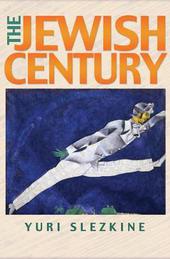
|
The Jewish Century
Paperback / softback
Main Details
| Title |
The Jewish Century
|
| Authors and Contributors |
By (author) Yuri Slezkine
|
| Physical Properties |
| Format:Paperback / softback | | Pages:456 | | Dimensions(mm): Height 235,Width 152 |
|
| Category/Genre | World history |
|---|
| ISBN/Barcode |
9780691127606
|
| Classifications | Dewey:940.0492400904 |
|---|
| Audience | | General | | Tertiary Education (US: College) | | Professional & Vocational | |
|---|
|
Publishing Details |
| Publisher |
Princeton University Press
|
| Imprint |
Princeton University Press
|
| Publication Date |
27 August 2006 |
| Publication Country |
United States
|
Description
This masterwork of interpretative history begins with a bold declaration: The Modern Age is the Jewish Age--and we are all, to varying degrees, Jews. The assertion is, of course, metaphorical. But it underscores Yuri Slezkine's provocative thesis. Not only have Jews adapted better than many other groups to living in the modern world, they have become the premiere symbol and standard of modern life everywhere. Slezkine argues that the Jews were, in effect, among the world's first free agents. They traditionally belonged to a social and anthropological category known as "service nomads," an outsider group specializing in the delivery of goods and services. Their role, Slezkine argues, was part of a broader division of human labor between what he calls Mercurians-entrepreneurial minorities--and Apollonians--food-producing majorities. Since the dawning of the Modern Age, Mercurians have taken center stage. In fact, Slezkine argues, modernity is all about Apollonians becoming Mercurians--urban, mobile, literate, articulate, intellectually intricate, physically fastidious, and occupationally flexible.Since no group has been more adept at Mercurianism than the Jews, he contends, these exemplary ancients are now model moderns. The book concentrates on the drama of the Russian Jews, including emigres and their offspring in America, Palestine, and the Soviet Union. But Slezkine has as much to say about the many faces of modernity--nationalism, socialism, capitalism, and liberalism--as he does about Jewry. Marxism and Freudianism, for example, sprang largely from the Jewish predicament, Slezkine notes, and both Soviet Bolshevism and American liberalism were affected in fundamental ways by the Jewish exodus from the Pale of Settlement. Rich in its insight, sweeping in its chronology, and fearless in its analysis, this sure-to-be-controversial work is an important contribution not only to Jewish and Russian history but to the history of Europe and America as well.
Author Biography
Yuri Slezkine is Professor of History and Director of the Institute of Slavic, East European, and Eurasian Studies at the University of California, Berkeley. He is the author of "Arctic Mirrors: Russia and the Small Peoples of the North" and coeditor of "In the Shadow of Revolution: Life Stories of Russian Women from 1917 to the Second World War" (Princeton).
ReviewsWinner of the 2005 National Jewish Book Award, Ronald S. Lauder Award in Eastern European Studies, Jewish Book Council Winner of the 2005 Wayne S. Vucinich Book Prize, American Association for the Advancement of Slavic Studies Winner of the 2004 Award for Best Professional/Scholarly Book in Religion, Association of American Publishers "One of the most innovative and intellectually stimulating books in Jewish studies in years... [An] idiosyncratic, fascinating and at times marvelously infuriating study of the evolution of Jewish cultural and political sensibility in the 20th century... Nearly every page of Slezkine's exegesis presents fascinating arguments or facts."--Publishers Weekly "Jews are not unique, [Yuri Slezkine] maintains in his fascinating new study, and it is only European provincialism that makes them seem that way... Slezkin"s interpretation of Jewish history ... is wonderfully antiparochial not only vis-a-vis the Jews but vis-a-vis America, which, he reminds us, not everyone saw as a promised land and which large portions of the huddled masses struggled to avoid."--Daniel Lazare, The Nation "To come across a daring, original, sweeping work of history in this age of narrow specialization is not just a welcome event; it is almost a sensation."--Walter Laqueur, Los Angeles Times "If Osama Bin Laden ever reads this book, he will be spinning in his cave."--Gene Sosin, The New Leader "For Slezkine, Jews, urban, mobile, literate, flexible, have been role models of adaptability in a changing modern landscape."--Joel Yanofsky, National Post "Brilliant... The Jewish Century is history on a majestic scale... [It] is fresh, compelling and frequently startling... The clarity of analysis is extraordinary, and the relatively simple conceptual tools Slezkine provides are unexpectedly powerful."--Noah Efron, Jerusalem Report "This book is witty, sardonic and clever, written with zest and brilliant imagination and presents us with remarkable images of our recent past."--John Levi, Australian Jewish News Yuri Slezkine's The Jewish Century defies standard categorization, and this makes it a masterly work of history."--Marc Dollinger, Journal of American History "[T]his is a brilliant book--it is extremely well written... Slezkine's book joins a very small number of first-rate studies of the modernization of the "Jews" seen through the lens of eastern rather than western history... Buy the book; read the book; use the book in Russian history and Jewish culture classes."--Sander L. Gilman, Slavic Review "The Jewish Century revives, with intellectual sophistication and stylistic verve, an old perception of the Jew's centrality to modernity."--Hillel Halkin, Commentary "Reading Yuri Slezkine's scholarly arguments ... may make for difficult reading but it also provides intriguing ventures into highly original thinking."--Jewish Book World "Yuri Slezkine's work... is a serious scholarly study of East European Jewry in the modern age, but dressed up in an eccentric and nonconventional style... [An] immensely entertaining and diputatious book... It is a work which will simultaneously inform, irritate, and entertain any reader with an interest in Russian, the Soviet, or modern Jewish history."--John D. Klier, Russian Review "This brilliant essay may significantly alter how we think about twentieth-century history... The part that the Jews played in Soviet Russia, or, perhaps better, the part that Soviet Russia played in the cultural imagination of the Jews, lies at the heart of the book."--Angus Walker, Central Europe
|